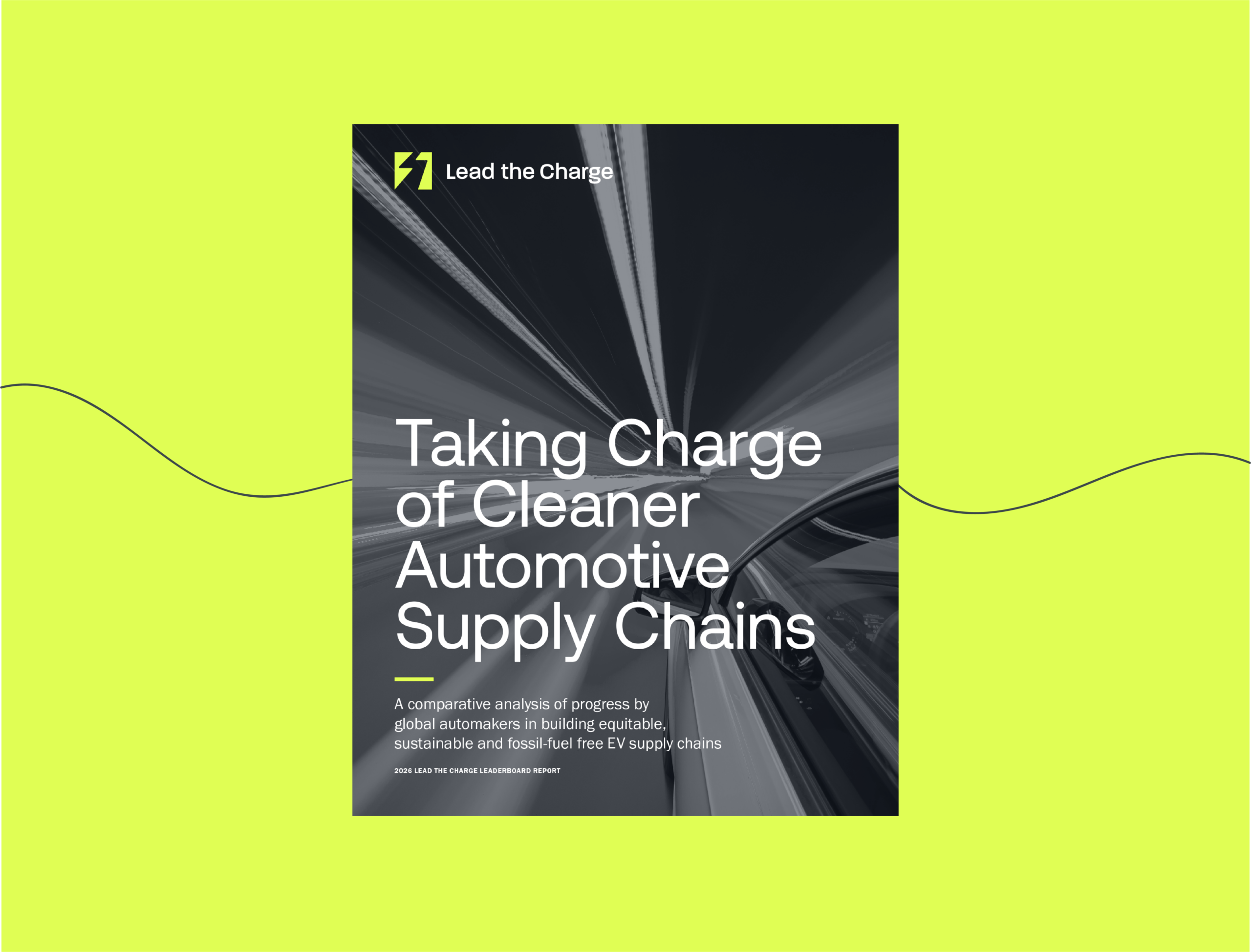Ranking
Comparison
Total Score
Environment
Human Rights
Summary
Tesla remains the top performing automaker of the Leaderboard for the second year running. Due to an overall score improvement of 6 percentage points, the company has actually managed to widen its lead from less than one percentage point ahead of Ford (in second place) in 2025 to over four percentage points in 2026.
Tesla’s improvements this year were most pronounced in the climate and environment section, where the company achieved an overall score improvement of 10 percentage points. The company improved in three out of the four subsections, with particularly notable progress in the aluminum and batteries subsections.
Nonetheless, Tesla continues to lag behind many industry peers on steel decarbonization and could also further improve its score in the battery subsection by providing more comprehensive and granular information on its battery circularity efforts.
Tesla’s performance on Human Rights has been more uneven, and Tesla remains behind Ford in all Human Rights areas. Tesla did achieve a notable 13 percentage point score improvement in the Workers’ Rights in the Supply Chain subsection, after becoming the first automaker to disclose concrete examples of remedy provided to supply chain workers for violations of their rights. This progress stands in stark contrast to Tesla’s terrible record on labor rights for its own operations. Tesla’s performance in the other human rights subsection stagnated this year, leading to an overall score improvement of 3 percentage points on human rights, considerably less than some of its competitors.
Key Findings
- The only automaker to disclose disaggregated scope 3 emissions from its steel, aluminum and battery supply chains, and continued to improve its battery supply chain disclosures with a detailed emissions breakdown for cell production and key materials, along with data coverage percentage for each category, setting a new best-practice standard for its peers.
- Introduced stricter supplier emissions requirements, mandating either an emissions monitoring plan or independent third-party verified product LCA.
- Signed a new procurement agreement for low-carbon aluminium in North America, with an emission intensity below 2kg of CO2e per kg. However, did not make similar progress on steel decarbonization, where the company scores notably lower.
- One of the top-performing automakers for the indicators on environmental due diligence for battery minerals, disclosing detailed information about risks identified and measures implemented in relation to the company’s nickel, lithium and cobalt supply chains. However, has made less progress than others on low-carbon battery mineral procurement.
- Remains one of the most transparent companies in relation to identified human rights risks, providing a good level of description, including in relation to conflict and transition minerals.
- Still fails to disclose data to demonstrate the scale of due diligence efforts, such as number of suppliers assessed prior to signing contracts and non-conformances found, number of suppliers audited, etc.
- Discloses the most detailed results from its supply chain mapping efforts and one of only two companies to provide a sufficient level of description regarding direct mineral sourcing agreements
- Now articulates an express commitment to the UNDRIP in its human rights policy, but still failing to articulate a similar commitment on FPIC.
- The only company to provide concrete examples of remedy provided to supply chain workers for breaches to their rights, but is also one of only four companies to not have a collective agreement with their workers, and the only US company not to have one.
Score Breakdown
Fossil-Free & Environmentally Sustainable Supply Chains
General
Steel
Aluminum
Batteries
Compare by year
Human Rights & Responsible Resourcing
General
Minerals
Indigenous' Rights
Workers' Rights
Compare by year
Supply Chain News & Progress
Latest on Tesla
Supply chain transformation is a risk management imperative and opportunity for a competitive edge. Leading brands are already securing a first-mover advantage and leveraging their power to transform legacy supply chains into a force for good. The revolution is underway.
Illegal rare earth mining in Myanmar linked to supply chain of major automakers
A new report by Global Witness has documented the harmful impacts of illegal rare earth mining in Myanmar, linked to the supply chains of major automakers – including Volkswagen, Toyota, Tesla, Nissan, Ford and Hyundai.
Tesla criticized for not respecting right to collective bargaining in Sweden
Tesla’s gigafactory to use recycled materials in battery cell production
According to TechCrunch, “Panasonic battery cells made at the Gigafactory it operates with Tesla will use more recycled materials by the end of 2022 as part of an expanded partnership with startup Redwood Materials.
Panasonic said Tuesday at the 2022 CES tech trade show that Redwood Materials will start supplying it with copper foil produced from recycled materials, a critical component of the anode side of a battery cell. Redwood will begin producing the copper foil in the first half of the year; the copper foil will then head to Panasonic where it will be used in cell production by the end of the year.”
Allegations of pollution, workers’ rights violations, forced labor and due diligence failings
The Business and Human Rights Resource Centre documents multiple allegations of human rights violations in Tesla’s supply chains, including pollution, forced labor, violations of workers’ rights, and failings to ensure effective human rights diligence. Nickel sourced by Tesla from Indonesia has also been linked to pollution affecting local communities.
Our Vision
01 — Equitably
Respecting and advancing the rights of Indigenous Peoples, workers, and local communities throughout the supply chain.
02 — Sustainably
Preserving and restoring environmental health and biodiversity across supply chains, while reducing primary resource demand through efficient resource use and increased recycled content.
03 — Fossil-free
100% electric and made with a fossil fuel-free supply chain.
